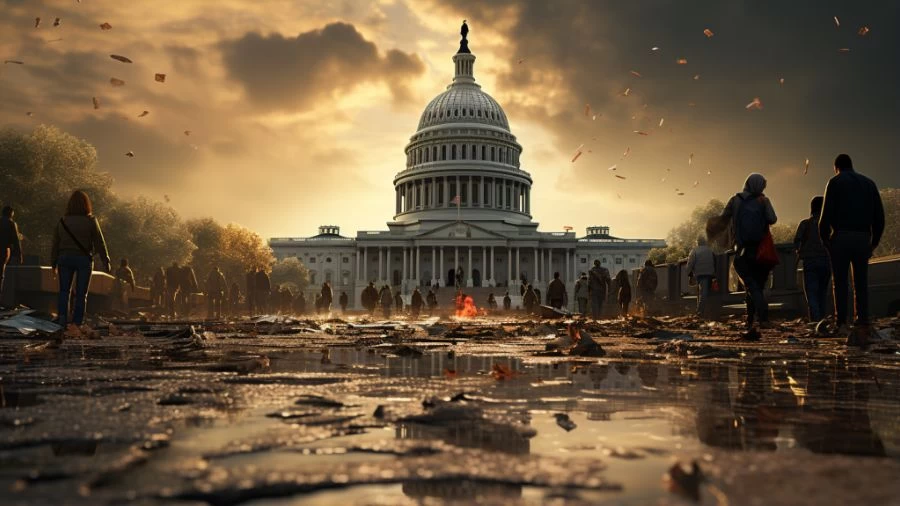
What Impact Does a Government Shutdown Have on the Stock Market?
When a government shutdown is looming or happens, it can create some uncertainty in the stock market and in the lead-up to a shutdown, like the one expected, investors might become nervous, and this uncertainty can lead to stock prices going down.
Published Sep 28, 2023 | Updated Sep 28, 2023 | 📖 5 min read
What Impact Does a Government Shutdown Have on the Stock Market?
When a government shutdown is looming or happens, it can create some uncertainty in the stock market. In the lead-up to a shutdown, like the one expected, investors might become nervous, and this uncertainty can lead to stock prices going down.
For example, the S&P 500 has already seen a decrease of over 5% this month, partly due to concerns related to the potential shutdown. However, once the shutdown actually begins, it may not cause a significant immediate reaction in the stock market. This is because many investors have already factored in the possibility of a shutdown into their decisions, and it's often reflected in stock prices.
In summary, while government shutdowns can contribute to market volatility and cause some fluctuations, their impact on the stock market is often limited and short-lived, as investors adjust to the new situation.
What Closes During a Government Shutdown?
During a government shutdown, various aspects of the federal government come to a grinding halt due to a lack of funding. This event can have far-reaching consequences, affecting both government operations and the lives of citizens. While many things are affected and some remain open:
What is Shut Down?
- Department of Defense: About half of the civilian workforce in the Department of Defense, along with full-time military technicians in the National Guard, are furloughed and not paid.
- Programs on Annual Appropriations: Programs funded by annual appropriations acts might be affected if they rely on these funds.
What Stays Open?
- Emergency Personnel: "Emergency personnel" like active duty military, federal law enforcement agents, doctors and nurses in federal hospitals, and air traffic controllers continue to work.
- Members of Congress: Members of Congress still receive their pay, as it can only be changed by a direct law.
- Mail Delivery: Mail delivery remains unaffected because it is self-funded and doesn't rely on Congressional appropriations.
- Washington, D.C. Municipal Government: Sometimes, the Washington, D.C. municipal government stays open if declared essential by the mayor. For instance, it remained open during the 2013 shutdown.
Why is the Government Shutting Down?
Government shutdowns typically occur when there's a dispute or disagreement over how the government's budget should be allocated before the current budget cycle expires. These disagreements can arise from various sources, including the President vetoing finalized appropriation bills or disagreements within one or both chambers of Congress. Often, it's the political party in control of a particular chamber that causes the deadlock over spending.
To temporarily prevent a shutdown, a continuing resolution (CR) can be passed, which extends government funding for a specified period. During this time, negotiations can take place to reach an agreement on an appropriation bill that satisfies all parties involved.
However, if there are issues with the content of the CR that lead to disagreements, and if the House, Senate, or President cannot pass the CR, a shutdown becomes inevitable. In rare cases, Congress may attempt to override a presidential veto of an appropriation bill or CR, but this requires two-thirds majority support in both chambers.
Navigating the complex landscape of Economy becomes easier with MarketsHost, your go-to destination for financial guidance and services.
Will TSA be Affected by Government Shutdown?
During a government shutdown, Federal Aviation Administration (FAA) employees, including air traffic controllers and Transportation Security Administration (TSA) agents responsible for airport security, are considered essential and would still have to work, even if they don't receive immediate pay. This means that flights can still operate, and air traffic controllers will continue guiding takeoffs and landings to ensure the safety of air travel.
However, TSA operations could be affected if the shutdown lasts for an extended period. While TSA agents will still be assigned to work at airport checkpoints, they won't receive their paychecks during the shutdown.
This could lead to some agents facing economic hardships and potentially calling out of work. During previous shutdowns, this situation resulted in longer security lines and delays at some airports. The White House has warned that working without pay for TSA officers and air traffic controllers could cause significant delays and longer wait times for travelers.
If you're an early bird who arrives at the airport well in advance of your flight, it might be beneficial during a shutdown, as it could help you navigate potential delays caused by staffing issues.
Government Shutdown 2023 When Will It Start?
A government shutdown for 2023 is expected to start on October 1, 2023, because lawmakers are not likely to pass the 12 appropriations bills required to fund government operations before the end of the fiscal year on September 30, 2023.
Despite Congress passing the Fiscal Responsibility Act earlier in June 2023, which set spending limits for fiscal years 2024 and 2025, there have been disagreements between House Republicans and Democrats regarding the allocated levels of spending.
House Republicans want to spend less than what was agreed upon in the Act, leading to a contentious situation where the appropriations bills in the House may not align with the Senate's bipartisan-supported bills. This political disagreement could result in a government shutdown starting on October 1, 2023, as Congress is not anticipated to pass the necessary funding bills by the fiscal year deadline.
What Happened to Markets During Previous Shutdowns?
During previous government shutdowns, which have occurred six times since 1990, the stock market has shown resilience. Looking at the median performance of the S&P 500 one month after the shutdown compared to one month before, the benchmark gained a median of 5.5%, with positive returns in five out of six instances.
This suggests that past shutdowns, despite their headlines and political drama, didn't significantly impact the stock market. According to experts, these events have been more about making noise in the headlines than causing substantial financial disruptions, with some humorously noting that they left "angered tourists more than disappointed traders."
What Impact Does a Government Shutdown Have on the Stock Market - FAQs
1. How does a government shutdown affect the stock market?
A government shutdown can contribute to stock market volatility, but its impact is often limited and short-term.
2. Do stock prices always decline during a government shutdown?
No, stock prices do not always decline during a government shutdown; it depends on various factors, including the length and severity of the shutdown.
3. Are there sectors of the stock market that are more affected by government shutdowns?
Sectors closely tied to government spending, such as defense and healthcare, may experience more significant impacts during a shutdown.
4. How long do the effects of a government shutdown on the stock market typically last?
The effects of a government shutdown on the stock market are usually short-lived, and markets tend to recover once the shutdown is resolved.
5. Should investors make significant changes to their portfolios during a government shutdown?
It's generally advisable for investors to maintain a long-term perspective and avoid making hasty investment decisions based solely on a government shutdown, as markets tend to rebound once the situation is resolved.




